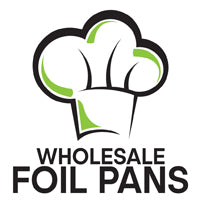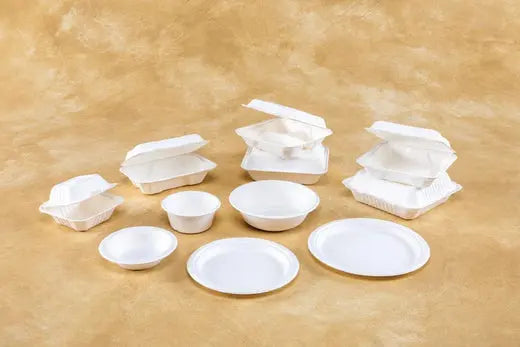With the increasing demand for eco-friendly alternatives, compostable disposables have gained significant attention. From restaurants to households, people are turning to these environmentally conscious products. But what exactly are compostable disposables, and how do they differ from other green options like biodegradable or recyclable items? In this guide, we’ll break down everything you need to know before making the switch.
Shop Our Molded Pulp Compostable Containers
What Are Compostable Disposables?
Compostable disposables are single-use products made from organic materials that can decompose into nutrient-rich compost when placed in an appropriate composting environment. Unlike traditional plastics that take centuries to break down, compostable materials degrade naturally without leaving behind harmful residues.
Earth Smart™ 5″ Round White Pulp Bowl, 16 oz.
Key materials used in compostable disposables include:
- Cornstarch
- Bagasse (sugarcane fibers)
- Bamboo
- Palm leaves
- PLA (Polylactic Acid) derived from fermented plant starch
These materials are designed to return to the earth, providing nutrients to the soil in a way that supports natural ecosystems.
Compostable vs. Biodegradable vs. Recyclable
When looking at eco-friendly products, it’s essential to understand the difference between compostable, biodegradable, and recyclable.
- Compostable disposables: Break down completely into compost within a specific time frame under controlled conditions, typically in a commercial composting facility.
- Biodegradable products: Decompose naturally over time but may not fully break down in a landfill environment and might leave behind microplastics.
- Recyclable items: Can be processed and re-used to create new products, reducing the need for raw materials but do not naturally decompose like compostable items.
Why Switch to Compostable Disposables?
Earth Smart™ 8″ Round White Pulp Bowl, 32 oz.
Switching to compostable disposables offers several advantages:
- Environmental benefits: Compostable products contribute to less landfill waste and reduce plastic pollution.
- Lower carbon footprint: Since these items are made from renewable resources, they have a smaller carbon footprint compared to traditional plastics.
- Health benefits: Compostable materials are often free from harmful chemicals, making them a safer option for food packaging.
- Supporting a circular economy: By using compostable disposables, you are actively participating in the reduction of waste and the regeneration of soil.
Earth Smart™ 8″ Round White Pulp Bowl, 32 oz
Things to Consider Before Making the Switch
While compostable disposables sound like an eco-friendly dream, there are several factors to consider before adopting them:
-
Access to Composting Facilities
- Most compostable disposables require specific conditions, such as high temperatures and moisture, to break down efficiently. Check if your area has commercial composting facilities or if you can compost these materials at home.
-
Cost
- Compostable products can sometimes be more expensive than their plastic or biodegradable counterparts. However, their environmental impact can offset the additional cost in the long run.
-
Quality and Durability
- Compostable disposables are typically less durable than plastic alternatives. They are designed for short-term use, so assess whether they meet your needs in terms of strength and durability.
-
Certifications
- Look for products that are certified as compostable. Standards such as BPI Certification or EN 13432 ensure that the disposables meet certain criteria for compostability.
-
Composting Time
- Compostable materials break down faster than traditional plastics, but they still require a controlled environment to decompose within a reasonable timeframe. Without proper conditions, they may take much longer to degrade.
Popular Compostable Disposable Products
When it comes to choosing compostable disposables, you have a wide variety of options. Some common products include:
- Compostable plates and bowls
- Compostable cutlery
- Compostable straws
- Compostable food containers
- Compostable coffee cups and lids
These products are ideal for events, restaurants, or any setting where single-use items are necessary but environmental responsibility is a priority.
D & W Fine Pack Earth Smart 10" Round Molded Fiber Plate
Conclusion:
Is the Switch Worth It?Switching to compostable disposables is a significant step towards reducing waste and protecting the environment. While it may involve higher costs and require access to composting facilities, the benefits far outweigh the drawbacks for those committed to a sustainable lifestyle. If you're considering making the switch, it’s essential to evaluate your needs, understand the composting process, and choose certified products.
By adopting compostable disposables, you're not only reducing plastic waste but also supporting a more sustainable future. Small changes in our daily habits, like choosing compostable over plastic disposables, can have a big impact on the environment.






